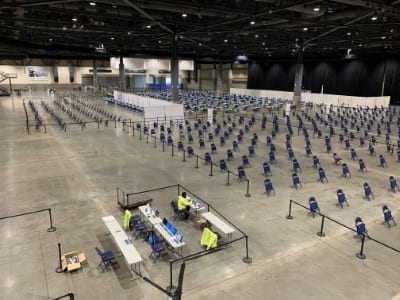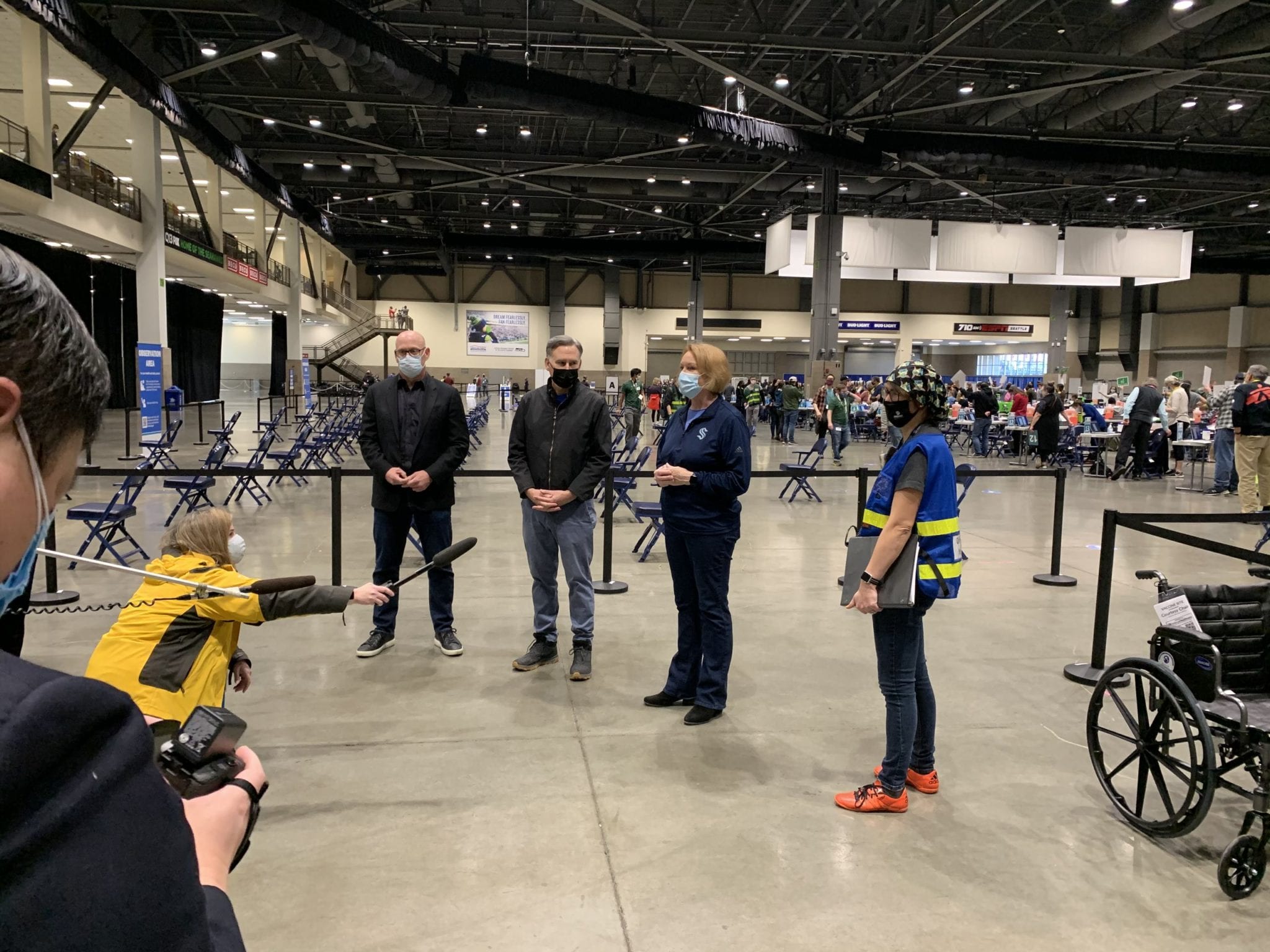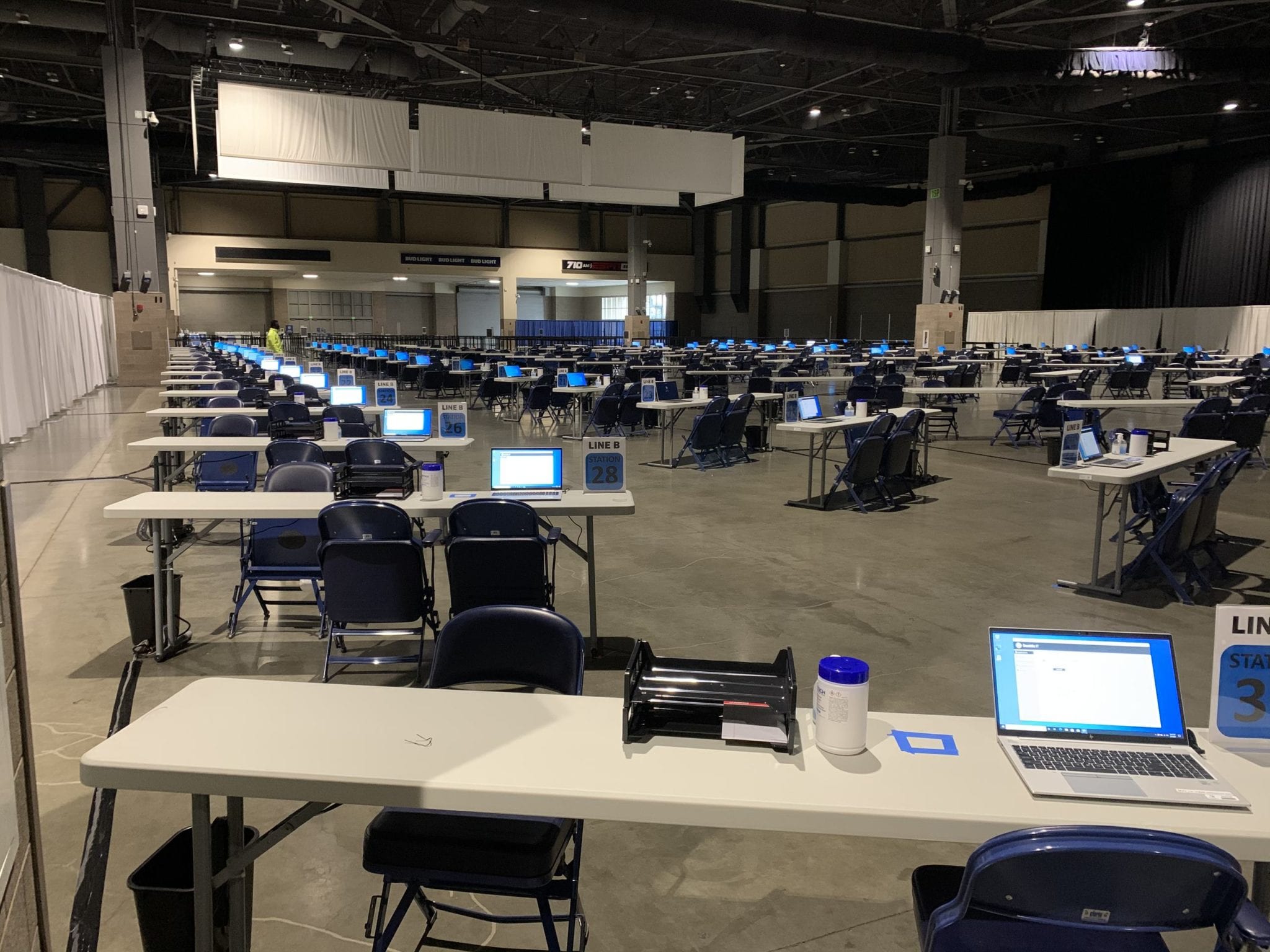
Seattle is a trailblazing city, especially when it comes to technology, global health, airplanes, and shopping, just to name a few. And now, after a year dealing with the coronavirus, we can also add pandemic management to that list. Seattle has the dubious distinction of being the first major US city to face widespread coronavirus outbreak and one of the first to grapple with policy decisions to close schools, cancel large events and encourage anyone who could, to work remotely, and to not see families and friends not in their households.
It’s been a devasting year for so many Seattleites, both mentally and physically health-wise and economically, and yet Seattle residents remain committed to the public health rules that abate the virus and protect the community. It turns out, the region has done a really good job. Seattle has the lowest death rate of the 20 largest metropolitan areas in the nation. A recent New York Times article reported that if the rest of the country had kept pace with what Seattle was able to do, the US could have avoided more than 300,000 coronavirus deaths.

Seattle’s effort to vaccinate its residents is also leading the nation with the largest civil-led mass vaccination site in the country. In just six weeks the City of Seattle, with our partners Swedish and First & Goal, Inc, have transformed 190,000 square feet at Lumen Field Event Center into a massive immunization clinic that can provide up to 22,000 vaccines a day, or 150,000 a week. As Finance and Administrative Services Director Calvin Goings said last week, “This is a pivotal moment in our eventual recovery.”
Seattle IT played a critical role in making the clinic a success — from procuring equipment, building websites, programming software, installing, testing, and supporting all the necessary technology and systems to make it possible to get shots in arms and help get life back to normal, or at least a new normal. The following include some of the experiences and impressions of four Seattle IT staff involved in this once in a lifetime endeavor.
Elaine Bautista, IT Asset Management Manager
The Asset Management team was responsible for procuring 300 laptops and 35 tablets needed for clinic operations. This proved to be more challenging than expected because during the pandemic, computers have been in short supply. The City’s vendors said they couldn’t deliver devices for at least 10-12 weeks, but they were needed in three weeks. After exhausting all other options, the decision was made to borrow from the supply the City uses to replace old machines and the team was able to deliver all 300 laptops on time.

“Procurement is what we do! We’re the behind-the-scenes people that make it happen. I told the team that when we DON’T hear anything, that’s when we know we’re doing our job well. No one thinks about the challenges that we might be facing or the hoops that we must jump through to source the equipment. They just know when it’s not there and they can’t do their work. Our job is to get it there.
It’s exciting to see the work we do materialize into something that directly benefits the community. We’ll see the laptops set up at the clinic on television and say, ‘hey we made that happen!’ And even for the team members who weren’t involved with Lumen, they’re playing a critical role in getting the rest of our work done. I am really proud of my team!”
Thanks to the entire Asset Management team!
Ivan Balbuena, Sr. Manager of Client Support
Client Support, a team of five led by Ivan Balbuena, set up all the devices, loaded and tested software, and mitigated connectivity issues during the past few weeks. Important benefits of the Lumen facility include Wi-Fi, which eliminated cable, and ample power, making the set up and testing of 300 laptops and 35 tablets somewhat less complicated. The team created a small network for printers, solved Wi-Fi connectivity issues outside the venue, acquired hotspots in case the Wi-Fi went down, and took care of a myriad of smaller details like obtaining locks for the computers and cases to protect the tablets. All of this was accomplished within four weeks.
“Our tech team is so invested in what’s happening all around them. They are real go-getters and want to help. They are here for a reason and it’s larger than just a paycheck. How proud I am of the entire team, not only for those here at the clinic but those back at the office, keeping the lights on, and picking up the slack for us.”
“15,000 sounds like a number. But it’s not just a number. It’s 15,000 people that will be saved from being in the hospital, or from dying or suffering. It’s huge. I think the clinic will stay in the minds of Seattleites for a long, long time. This has been a very fulfilling assignment.”
Thanks to team members: Geramy Wong, Emmanuel Arhu, Julian Brooks and Tan Trinh.
Kim Dowden, Sr. Project Manager Applications
During the first few weeks of the project, Kim’s team worked to get everything in place so the technology hardware and software could support the opening week of clinics at Lumen. The team helped to ensure the system was in “minimum viable product (MVP)” status to be able to handle appointment and scheduling needs during the first weeks of operation. The last two weeks have been focused on getting laptops and tablets up and running, supporting staff (City, Swedish, Seattle Center) and volunteers with system use, troubleshooting and coordinating with the vendor (Signetic), and reviewing/reconciling data. The work of overseeing and implementing enhancements is an ongoing effort and much more will happen on that end moving forward.
“Working at the clinic on the opening day really showed me what public service is all about. We’ve been struggling with this virus for a year, and it’s been exhausting but when the first patient checked in, everyone inside that huge room clapped and cheered. And then when the first patient got the first poke, we all clapped and cheered again. I felt like we were finally taking a step forward to getting back to normal.”
“The 400 volunteers at the clinic are doing all the data entry. On the first day we vaccinated 2,100 individuals and tomorrow there are 3,500 appointments on the schedule. That’s a ton of data and our systems have to support all the processes from public signup to scheduling appointments; managing vaccination codes and lot number of vaccine; the who, what, when and what arm. It is fast paced and exciting. As a PM, I like to plan. It’s awesome to be part of whatever it takes! One Lumen!”
Thanks to team members:Ivan Balbuena, Germany Wong, Seattle IT; Jessie Thelen, Sherri Crawford, Finance and Administrative Services(FAS); Leah Tivoli, the Mayor’s Office and Sarah Smith, Seattle Fire Department
Spencer Bahner, Radio Shop Manager
The Seattle IT radio team sourced 80 portable radios and supporting equipment. The team quickly procured the radios, configured, and tested the equipment. The radio solution has been useful in providing short range, rapid communications between the various teams working within and around the venue.
“FAS called and said we’re going to have a bunch of people roaming around the Lumen vaccination clinic and we need instant communication and we’re going to need 80 portable radios. And, by the way, we’re going to need them delivered in two weeks. Well, we didn’t have that many on hand, so we got the okay to lease them. Our vendor and ITD did a great job in turning it around quickly and we were able to deliver them on time. Special thanks go to Nic Prior who reprogrammed them all and made sure they were functional.”
“Our team had prior experience with Lumen last year when we helped the National Guard set up the COVID-19 field hospital. We deployed communications enhancements installing signal boosters into the enclosed building. Thankfully, Seattle didn’t have to use that field hospital.”
Thanks to team members: Nic Prior and Deanna Sebring.
Many thanks to EVERYONE in Seattle IT who participated in this project. As Kimberly Dowden mentioned above, this is what public service is all about!
If you are eligible for a vaccination under the state’s current criteria, or feel you will be once it expands on March 31, to include all restaurant and construction workers, and all Washingtonians 60+, please consider registering for the City’s vaccination appointment notification list or contacting your primary healthcare provider to schedule an appointment. For more information on vaccines, visit the City of Seattle’s vaccination page.